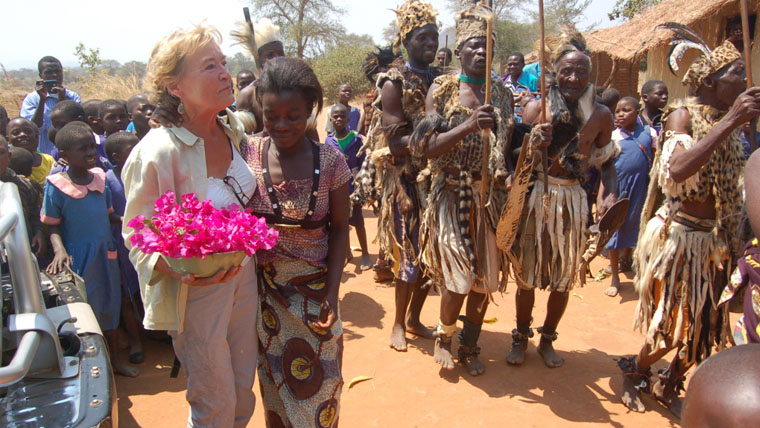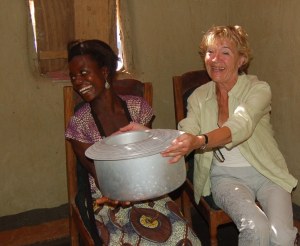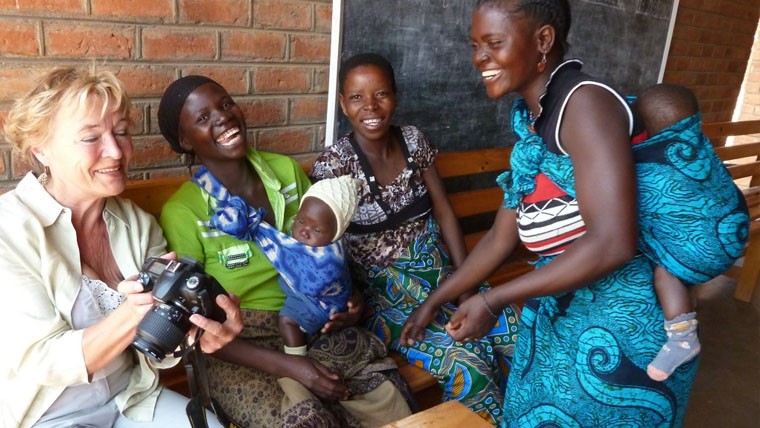Dancing, Mud Huts and Dreams in Malawi
Lisa Blunt, a World Vision Child sponsor, blogs about her recent trip to Malawi and all of the sights, sounds, smells and feelings that came with it.

Have you thought about visiting your sponsored child? Fast-forward through the questioning of whether it is a waste of money or an investment for their future, through the CRB checks, injections and airports, through the meetings with WV officials talking about the theory, the projects and the aims and do it. This month my hope to meet one of my church’s sponsored children, came true.
At last, we (I and two wonderful helpers from World Vision, Happy and Bornwell) are there, in remote Malawi, at the end of 6 hours driving, on rough and dusty tracks. I am excited and just trying to take it all in. Then I recognise Sithembire – the girl my church has sponsored for 8+ years. We have seen her in photos grow from chubby cheeked youngster to a young woman. But here she is, slight and shy, holding out a bowl of brilliant bougainvillea – and we hug.
I had not known what to expect, but the welcome was extraordinary . Even before we reach Sithembire’s village, we are flanked by excited children and welcomed with a ingoma dance from the men of her Ngoni tribe – all wrapped in animal skins with skin covered shields and spears. Proudly they then walk in front of our jeep, leading us to the village and to Sithembire. It is another world, her world.
 The whole village is seated under the shade, benches are filled with local dignitaries and the master of ceremonies has his programme and from somewhere, chairs have been imported for us to use. There is more spirited traditional dancing and formal introductions- including one expected from me. Finally Sithembire and I are allowed to go into her home to share the dishes of food, donated by various households, with her sisters, brothers, mother and aunts.
The whole village is seated under the shade, benches are filled with local dignitaries and the master of ceremonies has his programme and from somewhere, chairs have been imported for us to use. There is more spirited traditional dancing and formal introductions- including one expected from me. Finally Sithembire and I are allowed to go into her home to share the dishes of food, donated by various households, with her sisters, brothers, mother and aunts.
We read about basic life in a hut made of mud without water and electricity, but to see it, to smell it, to feel it was so meaningful. In many small and not so small ways her life and those of her family and her village are being changed but not revolutionised. She has better health with worming and bilharzia treatments, has improved sanitation and safe water from the bore hole, she sleeps under a mosquito net and, at 18 years, is still enjoying school.
The reality of Sithembire’s life was not the only aspect that came alive with the visit. Happy took me to the Pregnancy Wing of the Health Centre where the open waiting space was full of ladies at their first pre-natal class, to the HIV/Aids nurse who was working to identify those needing medication to prevent full blown Aids and to the headteacher of the area’s secondary school.
 World Vision has worked with other partners to build a hostel for girls so they can attend the school safely and not walk 25 kilometres to school – or drop out of education. At a meeting gathered to discuss Child Protection issues, some of World Vision’s partners or stakeholders talk about their advances and their concerns – the dairy cows are increasing and improving nutrition for many; the Magistrate is pleased that there are processes to deal with child abuse; three young people talked about their work on child labour and child work which is so important in their area because of the use – and poisoning – of children in the tobacco industry.
World Vision has worked with other partners to build a hostel for girls so they can attend the school safely and not walk 25 kilometres to school – or drop out of education. At a meeting gathered to discuss Child Protection issues, some of World Vision’s partners or stakeholders talk about their advances and their concerns – the dairy cows are increasing and improving nutrition for many; the Magistrate is pleased that there are processes to deal with child abuse; three young people talked about their work on child labour and child work which is so important in their area because of the use – and poisoning – of children in the tobacco industry.
Working with partners to share the best use of resources, using people in the villages, like the lead mothers, to embed developments in the community and the way that World Vision offices reflect the African style of buildings were good to see (unlike the EU and UN that seems to spend a fortune on modern glass buildings, landscaping and the biggest 4x4s).
One of the most poignant moment was watching Sithembire work through her answer to the question ‘What do you most want?’ She started with ‘a mobile phone’ – that would be cool and modern. But quickly she realised that she could not afford to run it and then said ‘a bicycle’ so she could ride the 6 kilometres to school and carry a brother or sister to the Health Centre when they are ill. But finally, she opted for a roof for their home. At the moment the sun is making a dappled pattern on the mud floor, but in two months the rains will be there. Young people grow up quickly in Malawi. Hopefully, a large tarpaulin will help for this year.
To go or not to go? If you can, do visit – you will be changed but also your sponsored child, their family and their village will respond with great joy and enthusiasm – and hope! And if you have any questions for me, about my trip or what life is like for children in Malawi please feel free to post them here or on World Vision’s Facebook page.
